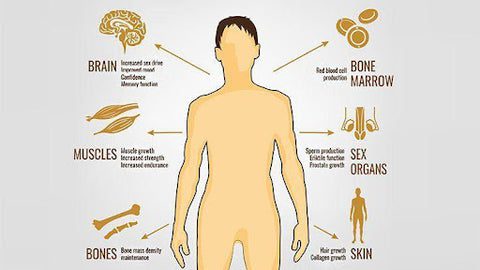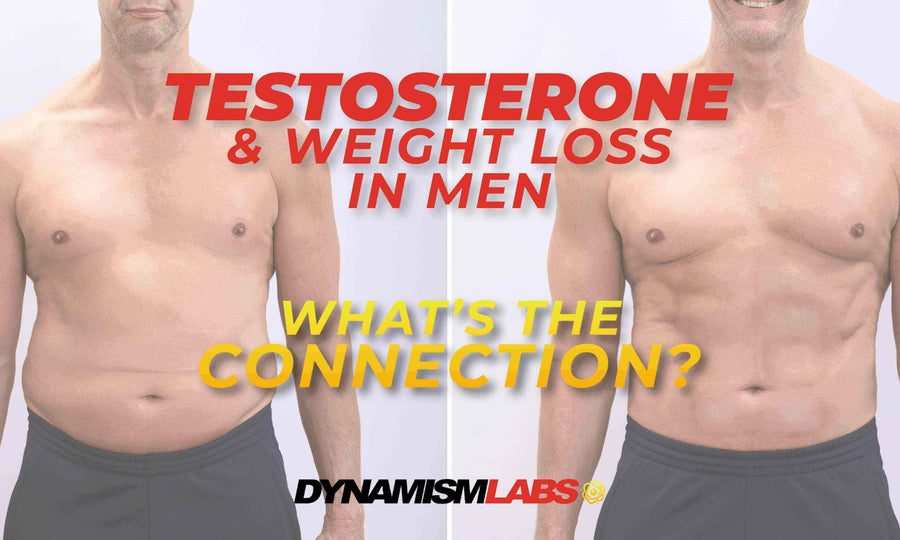Table of Contents
Toned muscles and a strong sense of confidence are the defining attributes of the ideal man for most men and women. This is also accurate when sexual attraction and masculinity are discussed.
Most men want to feel ripped, confident, and alive inside. For some, that motivates them to hit the gym every now and then to get closer to that image. For others, it leaves them feeling depressed with a sense of low self-esteem.
Looks aside, though, having too much fat in your body can lead to many health complications and side effects like cardiovascular diseases, metabolic challenges, kidney disease, and more. As studies suggest, it also means lower testosterone, which is the number one figure in developing a man’s primary and secondary characteristics, including maintaining a healthy weight and figure.
So, why do obese men have lower T (testosterone) levels, and ripped men have higher testosterone levels? Let’s find out.
What is testosterone?
First on our discovery list is the big shot — Testosterone.
Testosterone is the primary male sex hormone in the body. This hormone is excreted from the testicles in men and from the ovaries in women. It has a broad list of important functions it does in the body.
For starters, it facilitates the development of the primary sex characteristics in men — prostate and testes. And then, the secondary characteristics — deep voice, hair growth, and increased bone density.


(source: everyday health)
Aside from that, T also acts as an anabolic steroid in the body which promotes metabolism. It then helps produce red blood cells, nitric oxide, estrogen (a female hormone that helps regulate libido, sperm, and erectile function), and more — having healthy testosterone levels is an absolute must.
But that’s not all. After excretion by the testicles, this messenger molecule finds its way through the bloodstream to compatible cells, where it bonds with their receptors and influences their performance.
So, when testosterone levels continue to dip below normal, healthy levels or remain low for long, it raises up a lot of direct and indirect side effects that you don’t want, which includes:
- Erectile dysfunction
- Low sex driv
- Reduced bone mass
- Increased bone fragility
- Infertility
- Increased fatigues
- Reduction in cholesterol metabolism
- Increase in body fats
- Swelling and tenderness in the breast tissues
- Sleep disturbance
- And emotional changes.
Can being overweight affect testosterone levels?
In simple words, yes.
It is already known that overweight men tend to have drastically lower T-Levels than balanced or ripped men. Beyond that, several studies link obesity to low total testosterone levels in men. Even moderately obese men can see a massive drop of over 30% in T-Levels.
This decrease is partly caused by hypothalamic-pituitary-testicular (HPT) axis suppression. It is a gland that encourages sperm development and maintenance. Additionally, there is the insulin resistance condition, which reduces sex hormone globulin.
In addition, belly fat is known to contain a higher level of the enzyme aromatase. This enzyme is in charge of converting testosterone into estrogen, making obese men carriers of more elevated estrogen hormones than regular male folks.
With these two hormones active in the bloodstream, the production of testosterone drastically reduces. This is because these hormones inhibit the development of gonadotropin-releasing hormone (GRH, which is in charge of the development of luteinizing hormones tasked with testosterone production.
In severe cases of obesity, free-roaming testosterone in the bloodstream is also reduced because of HPT suppression. This, in turn, increases fat and leaves 70% of severely obese men at the risk of suffering hypogonadism – a testosterone deficiency condition that makes men lose their secondary masculine characteristics – deep voice, hair growth, and thicker bone mass.
It is good to note that these conditions are often reversible with weight loss and increased testosterone levels.
Is higher testosterone linked to weight loss?
It’s one thing for weight gain to lead to a drop in T levels. But is the reverse the case?
The straightforward answer is yes.
Several studies suggest that an increase in T-Levels lead to weight loss, overall health improvement, and the alleviation of weight gain and low testosterone symptom in obese men.
This remains the case even for severely obese men suffering from testosterone deficiency. With a good testosterone treatment or therapy, these men can witness improvement in their general health, metabolism issues and regain a fit body frame.
When this is matched with a healthier lifestyle change, this transformation sticks for the long term.
How to gain higher testosterone levels?
There are three ways to gain high levels of testosterone in your body. They include:
1.Anabolic steroids
You might recall we mentioned this before, but here we aren’t referring to Testosterone, but to steroids.
Androgenic anabolic steroids (AAS) are human-made (synthetic) versions of Testosterone. As such, this method of gaining higher testosterone doesn’t seem to affect fat reduction or the body’s metabolism.
In fact, what scientists can verify about steroids is that short-term intake leads to a significant increase in testosterone levels, strength, and body weight. Strength levels can go from 5 to 20%, whereas body weight can go from 2 to 5 due to increased lean body mass.
This is why some bodybuilders and men tend to abuse AAS, which brings us to its abuse and long-term side effects and consequences. Raising your testosterone levels beyond normal levels to boost strength and muscle growth is illegal in most parts of the world. It causes an adverse change in behavioral patterns, sexual dysfunction, liver issues, and cardiovascular complications.
For this reason, it is unwise for people with normal testosterone levels to use AAS.
2. Testosterone therapy
Unlike AAS, Testosterone replacement therapy isn’t prone to self-medication. It is a legal treatment administered by health professionals to obese men and people suffering from testosterone deficiency.
As studies have shown, TRT packs the much-needed symptom alleviation that comes with higher testosterone levels. People undergoing the treatment see improvements in their
- Mood (3-6wks)
- Body mass — from fat to lean (12-16wks)
- Inflammation (3-12wks)
- Bone mass (6 months)
- Erection and ejaculation (1-6mnths)
- Libido (3-6wks)
- Erythropoiesis (9-12mnths)
- Prostate-specific antigens (12 months)
- Lipids (6-12mnths)
The treatment is administered as a skin patch, cream, supplement, or injection. Studies show that obese men who are given the therapy lose fat and gain muscle, indicating that testosterone helps in weight loss by promoting the characteristics of the “ideal man” in your body.
But it is good to note that these studies focused on the effect of the treatment on men who are suffering excess weight gain and T deficiency, not regular folks with a healthy testosterone level.
3.Testosterone Boosters
Now that that is out of the way, here is another way you can get your testosterone levels up, whether on your own or through medical supervision – T-boosters.
Also called “natural testosterone supplements,” T-boosters aren’t testosterone replacements or synthetic. They are plant-based boosters, meaning they encourage a higher release of testosterone into your bloodstream.
However, not all boosters contain the right ingredients to produce results on their own. Boosters made from Tribulus Terrestris have been found to have a high effect on nitric oxide but little to no impact on T levels, suggesting that to get the desired effect, TT-based boosters must be taken as a combined treatment.
A good testosterone booster for men contains crucial ingredients like Saw Palmetto, Horny Goat Weed, and Tongkat Ali extracts. An example of such a product is ManTFUP T-booster. To learn more about testosterone boosters and their effect on the body, check outA Guide to Testosterone Boosters
Are testosterone levels linked to age?
Yes,
Science has found out that as men hit 30, they witness a steady decline of 1% per year in serum testosterone levels, free-roaming testosterone levels, and an increase in sex hormone-binding globulin (SHBG)levels. This protein regulates the access of free-roaming testosterone to target cells by binding with them.
This is a natural occurrence that can tank your gyming results without supplemental assistance and food changes. To learn more about keeping an optimal T level and avert its side effects as you age, check out “How To Fix Low Testosterone in Men Over 50 “
At Dynamism Labs Parent company of ManTFup, we’re focused and dedicated to helping men live confidently. If you want to grow a thicker, natural beard, you can rely on Dynamism’s Ultimate Beard Growth. It’s scientifically formulated using powerful natural ingredients that are proven to increase the beard’s thickness, fullness, and overall appearance. With the best beard growth supplement on the market, you can grow your beard thicker and quicker!
Reference:
- NIH Risk of overweight & obesity
- NIH Understand how testosterone affects men
- PubMed The role of estradiol in male reproductive function.
- Healthline (Feb. 28, 2019)Low testosterone in men
- IJIR (Oct. 9, 2008) Obesity, low testosterone levels, and erectile dysfunction – Nature
- NCBI (Jan. 20, 2014) Lowered testosterone in male obesity: mechanisms, morbidity, and management
- NCBI Estradiol in elderly men
- NCBI (Aug. 28, 2014) Testosterone and weight loss: the evidence
- PubMed Effect of androgenic- anabolic steroids in athletes
- PubMed Adverse health effects of anabolic-androgenic steroids
- NCBI (Nov. 2011) Onset of effects of testosterone treatment and time span until maximum effects are achieved
- PubMed A systematic review on the herbal extract Tribulus Terrestris and the roots of its putative aphrodisiac and performance-enhancing effect
- Medpage Today (Oct. 31, 2016) Testosterone Decline With Aging: What Is Normal

